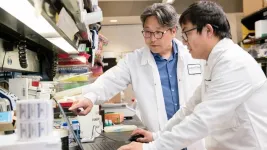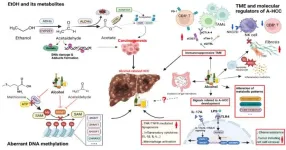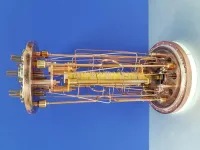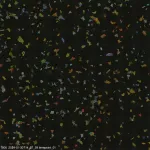(Press-News.org) This year’s Communicator Award presented by the Deutsche Forschungsgemeinschaft (DFG, German Research Foundation) and Stifterverband goes to an interdisciplinary research team consisting of one computer scientist and two cultural scholars, all of whom are based in Tübingen: Ulrike von Luxburg, Professor for the Theory of Machine Learning at the University of Tübingen, Tim Schaffarczik, doctoral researcher at the Institute of Historical and Cultural Anthropology, University of Tübingen, and Thomas Thiemeyer, Professor of Museum Studies, likewise at the Institute of Historical and Cultural Anthropology in Tübingen. They receive the award worth €50,000 in recognition of their outstanding and diverse science communication in developing and implementing of the exhibition “Cyber and the City: Artificial Intelligence Moves Tübingen”, which also provides a role model for how to engage in dialogue on other controversial topics relating to science and technology.
Chaired by DFG Vice President Professor Dr. Johannes Grave and made up of science journalists as well as communication and PR experts, the jury said in its decision that the “Cyber and the City” team had transported the abstract and controversial topic of artificial intelligence into the world of people’s day-to-day lives and experience, while also opening up a space for dialogue that allowed negotiation of starkly differing points of view and interests.
In order to achieve this, the jury’s statement went on, the team had engaged in a productive interdisciplinary collaboration between computer science and empirical cultural studies to create an exhibition at Tübingen City Museum, complete with accompanying programme. Students of the two disciplines did the groundwork for the exhibition and the other communication channels, involving interest groups, citizens, activists and decision-makers in both conception and implementation. According to the Communicator Award jury, the result was a communication platform that finds a common language to address the challenges and opportunities of artificial intelligence while allowing both supporters and sceptics of AI to have their say.
An extensive accompanying programme was developed which enabled exhibition participants to organise their own events. The latter included a “Retro Gaming Night meets AI” and also a panel discussion entitled “Who controls AI?”, organised in cooperation with broadcaster SWR. From February to early December 2023, the exhibition attracted approximately 40,000 visitors from different age groups – in a city with a population of around 90,000. Taken as a whole, the exhibition and accompanying programme established a framework for dialogue that provided an objective basis for the highly controversial debate surrounding artificial intelligence in Tübingen without neglecting emotions and standpoints.
The Communicator Award jury emphasised that one vital element of the project was the fact that communication is locally oriented: despite being something that takes effect on a global scale while also being an issue that was difficult for most people to grasp, AI was negotiated here based on concrete examples, informed by impassioned debate in the city and involving local actors. What is more, the whole thing did not take place in digital forums but in direct dialogue between the participants. The jury said that this demonstrated how successful the team had been in exploring a tough issue in a light, humorous way while still maintaining objectivity and a keen sense of judgement. All in all, the jury saw the team’s work as a fine example of dialogue-based science communication that went well beyond the location and the specific topic. According to the jury, this was an especially encouraging project in the light of a contemporary dialogue culture which barely permitted constructive exchange between different arguments and standpoints.
The Communicator Award – Science Award of the Stifterverband has been awarded every year since 2000 and is regarded as Germany’s most important prize of its kind. The award goes to researchers who are particularly creative in their science communication, taking new, courageous paths and addressing their target groups in suitable and effective ways. They must also recognise the societal dimension of their research and contribute their knowledge to public debate, opinion-forming and decision-making processes. The prize money supports the recipient’s public engagement activities and enables them to implement new projects.
The jury selected the winning team by means of a multi-stage selection process out of 38 applications and nominations. The Communicator Award will be presented by DFG President Professor Dr. Katja Becker and former Stifterverband President and Honorary Member Professor Dr. Dr. Andreas Barner at the DFG annual meeting in Potsdam on Monday, 01 July 2024.
Further information
For information on the Communicator Award, see:
www.dfg.de/communicator-preis
Media contact:
Magdalena Schaeffer, DFG, Press and Public Relations, Tel. +49 228 885 2109, presse@dfg.de
Peggy Groß, Stifterverband, Press Officer, Tel. +49 30 322982-530, presse@stifterverband.de
Media contact at the award winners’ institute:
Oliver Häußler, University of Tübingen, University Communication, Tel: + 49 7071 29-77851
oliver.haeussler@uni-tuebingen.de
Theresa Authaler, Cluster of Excellence “Machine Learning”, Tel: +49 162 1788206,
theresa.authaler@uni-tuebingen.de
Photograph of the 2024 Communicator Award winners:
Download
Credit: Friedhelm Albrecht/University of Tübingen
The photograph shows (from left to right) Tim Schaffarczik, Ulrike von Luxburg, Thomas Thiemeyer
END
2024 Communicator Award goes to “Cyber and the City” research team based in Tübingen
2024-04-19
ELSE PRESS RELEASES FROM THIS DATE:
A new therapeutic target for traumatic brain injury
2024-04-19
SAN FRANCISCO—April 19, 2024—For the roughly 1.5 million Americans per year who survive a traumatic brain injury, health outcomes vary widely. Not only can these injuries lead to a loss of coordination, depression, impulsivity, and difficulty concentrating, but they come with an amplified risk for developing dementia in the future.
The glaring absence of treatments for such a widespread condition drove a team of scientists at Gladstone Institutes to uncover, on a molecular level, how traumatic brain injuries trigger neurodegeneration—and just as importantly, how to target that process to prevent long-term damage.
“We set out to ...
Cosmic rays streamed through Earth’s atmosphere 41,000 years ago
2024-04-19
Earth’s magnetic field cocoons our planet from the onslaught of cosmic radiation streaming through space while also shielding us from charged particles hurled outward by the sun. But the geomagnetic field is not stationary. Not only does magnetic north wobble, straying from true north (a geographically defined location), but occasionally, it flips. During these reversals, north becomes south, south becomes north, and in the process, the intensity of the magnetic field wanes.
But there’s also ...
ACP issues clinical recommendations for newer diabetes treatments
2024-04-19
Embargoed for release until 9:00 a.m. ET on Friday 19 April 2024
Embargoed Content from the Annals of Internal Medicine Breaking News Scientific Plenary at Internal Medicine 2024
Annals of Internal Medicine Tip Sheet
@Annalsofim
Below please find summaries of new articles that will be published in the next issue of Annals of Internal Medicine. The summaries are not intended to substitute for the full articles as a source of information. This information is under strict embargo and by taking it into possession, media representatives are committing ...
New insights into the connections between alcohol consumption and aggressive liver cancer
2024-04-19
While heavy drinking is a well-established risk factor for liver cancer, the specific mechanisms by which alcohol contributes to A-HCC remain unclear.
This insightful review, published in Hepatology, provides a comprehensive summary of the pathogenesis, heterogeneity, preclinical approaches, epigenetic and genetic profiles of A-HCC. Compared to other types of liver cancer, A-HCC is often diagnosed at a later stage, when the disease is more advanced. This is partly due to a lack of readily available screening tools for individuals with alcohol-related liver disease (ALD).
"A-HCC is a serious public health concern," ...
Unraveling water mysteries beyond Earth
2024-04-19
The first clue for finding life on other planets is finding liquid water. The moons of Saturn and Jupiter like Enceladus, Ganymede, Europa, and Callisto are suspected of holding oceans of liquid water beneath icy crusts. Similarly, some exoplanets beyond our solar system likely host liquid water, crucial for habitability. But detecting water, when we can’t physically access these celestial bodies, poses challenges. Ice-penetrating radar, a geophysical tool, has proven capable of detecting liquid water ...
Signs of multiple sclerosis show up in blood years before symptoms
2024-04-19
In a discovery that could hasten treatment for patients with multiple sclerosis (MS), UC San Francisco scientists have discovered a harbinger in the blood of some people who later went on to develop the disease.
In about 1 in 10 cases of MS, the body begins producing a distinctive set of antibodies against its own proteins years before symptoms emerge. These autoantibodies appear to bind to both human cells and common pathogens, possibly explaining the immune attacks on the brain and spinal cord that are the hallmark of MS.
The findings were published in Nature Medicine on ...
Ghost particle on the scales
2024-04-19
In the 1930s, it turned out that neither the energy nor the momentum balance is correct in the radioactive beta decay of an atomic nucleus. This led to the postulate of "ghost particles" that "secretly" carry away energy and momentum. In 1956, experimental proof of such neutrinos was finally obtained. The challenge: neutrinos only interact with other particles of matter via the weak interaction that is also underlying the beta decay of an atomic nucleus. For this reason, hundreds of trillions of neutrinos from the cosmos, especially the sun, can pass through our bodies every second without causing any damage. Extremely ...
Light show in living cells
2024-04-19
Observing proteins precisely within cells is extremely important for many branches of research but has been a significant technical challenge - especially in living cells, as the required fluorescent labelling had to be individually attached to each protein. The research group led by Stefan Kubicek at CeMM has now overcome this hurdle: With a method called "vpCells," it is possible to label many proteins simultaneously, using five different fluorescent colours. This automated high-throughput approach, aided by AI-assisted image recognition, opens up entirely new applications in various disciplines, from fundamental cell biology to drug discovery. The study ...
Climate change will increase value of residential rooftop solar panels across US, study shows
2024-04-19
Graphic
Climate change will increase the future value of residential rooftop solar panels across the United States by up to 19% by the end of the century, according to a new University of Michigan-led study.
The study defines the value of solar, or VOS, as household-level financial benefits from electricity bill savings plus revenues from selling excess electricity to the grid—minus the initial installation costs.
For many U.S. households, increased earnings from residential rooftop ...
Could the liver hold the key to better cancer treatments?
2024-04-19
PHILADELPHIA – Liver inflammation, a common side-effect of cancers elsewhere in the body, has long been associated with worse cancer outcomes and more recently associated with poor response to immunotherapy. Now, a team led by researchers from the Abramson Cancer Center and Perelman School of Medicine at the University of Pennsylvania has found a big reason why.
In their study, published today in Nature Immunology, the researchers discovered that cancer-induced liver inflammation causes liver cells to secrete proteins called serum amyloid A (SAA) proteins, which circulate through the body and hinder the ability of T cells—major anticancer weapons of the immune system—to ...



